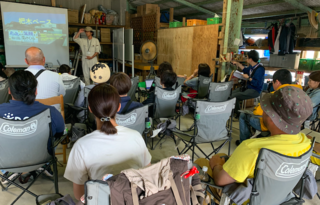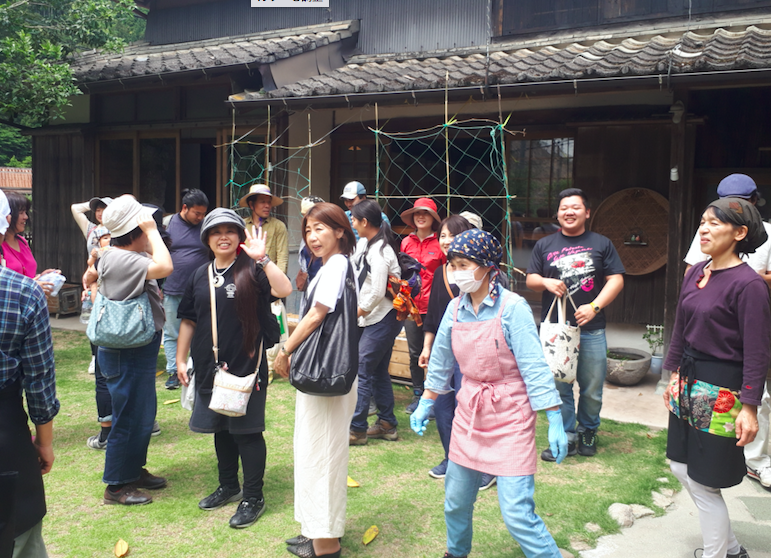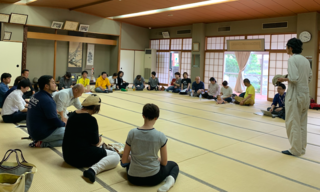The Leading Disaster Relief Agency Civic Force
2019/07/17
【West Japan Floods】 NPO Partner Projects: Study Tour to Connect Disaster-Affected Areas

It has been more than a year since the West Japan Floods in July 2018. The worst flooding disaster of the past three decades not only affected Hiroshima and Okayama Prefectures, but also brought significant damage to Uwajima City in Ehime Prefecture. The recovery efforts are still underway in the affected areas. Amid the ongoing recovery efforts, a study tour for the affected communities in Uwajima City was held on May 14 – 16 and around 30 people participated in the tour.
...... ......
The group visited the Kyushu region that was devastated by heavy rainfall in 2017, including Hita City in Oita Prefecture and Asakura City and Toho Village in Fukuoka Prefecture.
The study tour was organized by NPO Liera (formerly Hichiku Volunteer Center), which started out in the wake of the 2017 heavy rain in Hita City. They provided disaster recovery assistance and is now hosting community events targeting residents of temporary housing. In Uwajima City, taking advantage of the experience in 2017, Liera is working with local authorities and local residents to provide long-term support to the victims of the disaster. Mr. Kenya Matsunaga, representative of Liera, said, “We would like to offer the people of Uwajima an opportunity to learn about the experiences and lessons learned from Oita and Fukuoka Prefectures that are still in the process of reconstruction. We would like to build on this opportunity for the reconstruction of Uwajima City. Through this trip, we wanted people affected by the disasters to meet and build a support system.”

“Haki Base,” a Hub for Local Groups in Asakura City, Fukuoka Prefecture
The first stop of the 3-day tour was the Haki area of Asakura City, Fukuoka Prefecture. During the heavy rainfall of 2017, the four tributaries of the Chikugo River overflowed and many slope failures caused soil and driftwood to flow into Haki.
The tour participants visited a hub for local groups called “Haki Base,” which was launched in the wake of disasters. Even though it has been two years since the disaster, there are more than 60 households who are still unable to return home. The participants learned that the concerns among the evacuees are becoming more unique and are not necessarily easy to fix by preselected assistance from the local municipalities.
Many victims from the Asakura City came to meet with the tour participants and shared their experiences immediately after the disaster and current living conditions. It was reiterated how important it is for the local communities to have a place to gather and talk freely.
Emergency Temporary Housing in Toho Village, Fukuoka Prefecture
Next stop was Toho Village in Fukuoka Prefecture, situated in a mountainous area. Immediately after the disaster, the road to the village was blocked due to landslides and some residents were isolated for three days. The tour group visited an emergency temporary housing complex called “Toho Village Housing Complex” (Danchi) installed on an elementary school field and met with the resident representative. The representative is responsible for over 46 residents from 22 households and organizing community events.

Temporary Housing Visits in Hita City, Oita Prefecture
In Hita City, a border town with Fukuoka Prefecture, a section of the JR Kyushu Tahikoyama Line is still suspended even to this day. The scars of the disaster are still seen in many places. At Inoue Sake Brewery in Otsuru District, founded in 1804, some of the stockpiles and storage tanks were flooded and sake bottles were also damaged. However, sake rice "Wakamizu," planted just before the disaster, miraculously grew and brewing was resumed. The tour participants heard from the brewery about their commitment to making sake despite the damages caused by the disaster.
The tour took the participants to a “kominka” (traditional Japanese house) café run by a community group of Suzuren Town. At the café, the participants learned about home visits to temporary housing that NPO Liera has conducted in Uwajima City. The residents of temporary housing in Hita City also shared about their concerns and living conditions with the group. “This was a great opportunity to directly hear from the residents about their concerns”, said the tour participants. This visit shed light on the importance of providing tailored assistance and ensuring victims’ voices are heard.
It Became Clear What Our Next Steps Should Be
One of the tour participants and a representative of a community group called “Uwajima Grandma” based in Uwajima City said, “Listening to the experiences of the community groups we met showed me what we should do next for our own community.” Others said “I learned from the community leader of temporary housing about how to care for residents and noticed that it’s almost like settai (practicing hospitality in business settings). I learned how to involve local residents.” The participants were able to reflect on their own activities back in Uwajima City and took note of what they could do to improve. Upon their return to Uwajima City, some participants promptly hosted community meetings and invited the local residents.

Hichiku Volunteer Center × Civic Force “NPO Partner Project”
In order to meet the changing needs of victims, Civic Force's “NPO Partner Project” promotes disaster recovery and reconstruction through collaboration with expert NPOs and local organizations. Since its launch in the wake of the Great East Japan Earthquake, the Project supported six organizations and 8 projects from July 2018 to July 2019 for the West Japan Floods. http://www.civic-force.org/emergency/nishinihon/partner/
When a disaster volunteer center operated by a local social welfare council was terminated 2 months after the disaster, Hichiku Volunteer Center was established to take over their activities. Civic Force started collaborating with Hichiku Volunteer Center after the heavy rainfall that hit the Kyushu region in 2017. In July 2018, the Center helped us send students who experienced the Great East Japan Earthquake to join volunteer activities in Hita City.For the West Japan Floods, Hichiku Volunteer Center supported disaster recovery activities in Uwajima City from August 2018 to May 2019. The Center is now closed but a local NPO called Liera has taken over some of its activities such as providing a “mimamori (watching over someone)” service targeting residents of temporary housing.









